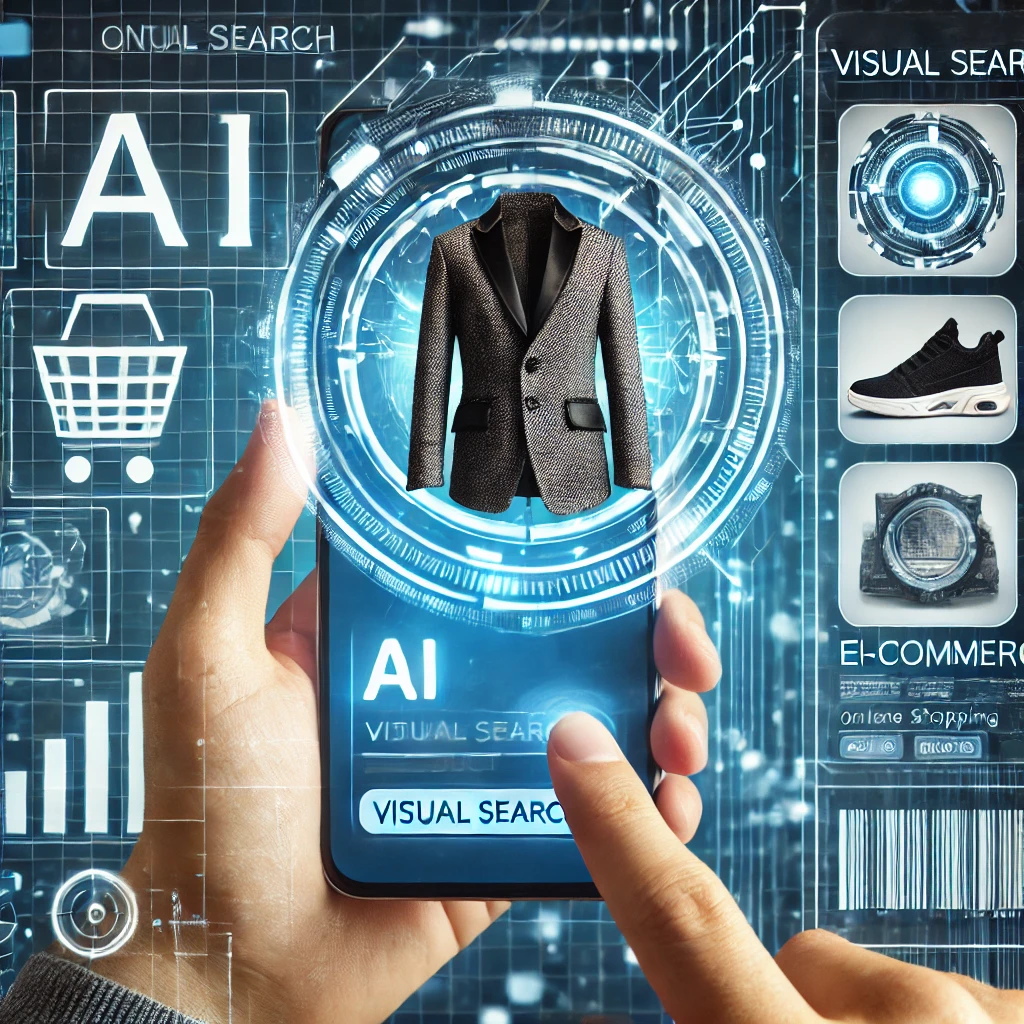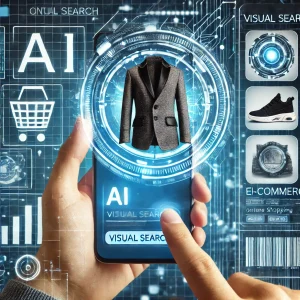
AI-driven visual search technology showcasing a shopper using an image to find similar products online.
How Artificial Intelligence is Enhancing Online Shopping Experiences

How Artificial Intelligence is Enhancing Online Shopping Experiences.
Explore how Artificial Intelligence is transforming online shopping experiences, from personalized recommendations to efficient operations and cutting-edge technologies.
Online shopping has become a cornerstone of modern retail, transforming how people purchase goods and services. Artificial Intelligence (AI) is at the heart of this evolution, revolutionizing the shopping experience through personalization, efficiency, and innovation. This article explores how AI is redefining online shopping, providing seamless customer experiences while optimizing business operations.
The Role of AI in Online Shopping
Artificial Intelligence brings sophisticated technologies to e-commerce platforms, enabling them to offer tailored experiences to customers. From personalized product recommendations to voice assistants, AI is reshaping the digital shopping landscape.
1. Personalized Shopping Experiences
AI leverages user data such as browsing history, preferences, and purchase behavior to deliver customized shopping suggestions. For example:
Recommendation Engines: Platforms like Amazon use AI algorithms to recommend products based on user preferences.
Dynamic Pricing: AI analyzes market trends and customer demand to adjust prices in real-time, ensuring competitiveness.
2. Enhanced Customer Support
AI-powered chatbots and virtual assistants provide 24/7 customer service, handling inquiries efficiently. These tools offer:
Instant responses to FAQs.
Seamless support through natural language processing (NLP).
Guidance during the purchasing process.

3. Visual Search Technology
AI enables shoppers to search for products using images instead of text. This feature benefits:
Customers seeking specific items without knowing their exact names.
Retailers aiming to improve user engagement and satisfaction.
READ ALSO: The Future of Tech Startups: Trends to Watch.
4. Voice Search and Assistants
Virtual assistants like Siri, Alexa, and Google Assistant leverage AI to allow voice-activated shopping. This technology simplifies searching, comparing, and purchasing products hands-free.
—
AI-Driven Operational Efficiency
Beyond enhancing the customer experience, AI optimizes e-commerce operations, streamlining various backend processes.
1. Inventory Management
AI predicts demand patterns, ensuring optimal stock levels and reducing overstock or shortages. This predictive analysis minimizes costs and maximizes sales.
2. Fraud Detection and Prevention
AI algorithms analyze transaction patterns to identify and prevent fraudulent activities, safeguarding both businesses and customers.
3. Efficient Logistics
AI optimizes delivery routes and timelines, ensuring faster and more reliable shipping. Companies like DHL and UPS leverage AI to enhance supply chain operations.
—
AI-Powered Marketing Strategies
E-commerce platforms use AI to refine their marketing campaigns, targeting the right audience with precision.
1. Behavioral Targeting
AI analyzes consumer data to create personalized advertisements. This approach improves ad relevance and click-through rates.
2. Email Marketing Automation
AI generates tailored email campaigns based on customer interactions, increasing engagement and conversion rates.
3. Content Optimization
AI tools optimize website content for search engines, boosting visibility and organic traffic.
—
Case Studies: AI Transforming Online Retail
Amazon’s AI Ecosystem
Amazon integrates AI into every facet of its business, from personalized recommendations to its Alexa-powered shopping assistant. This innovation has significantly boosted customer satisfaction and sales.
Zalando’s Visual AI
Fashion retailer Zalando uses AI-driven visual search to match customer-uploaded images with similar products, enhancing the shopping experience.
—
Challenges and Ethical Considerations
While AI enhances online shopping, it raises concerns, including:
Data Privacy: The extensive use of customer data requires robust privacy measures.
Bias in Algorithms: Unchecked biases in AI models can lead to discriminatory practices.
Job Displacement: Automation could impact jobs in traditional retail sectors.
Addressing these issues is crucial for sustainable AI adoption in e-commerce.
—
The Future of AI in Online Shopping
AI continues to evolve, offering new possibilities such as:
Augmented Reality (AR): Allowing customers to visualize products in real-world settings.
Hyper-Personalization: Delivering more precise recommendations based on real-time data.
AI-Driven Analytics: Providing deeper insights into customer behavior to refine business strategies.
—
Conclusion
Artificial Intelligence is revolutionizing online shopping by enhancing customer experiences, optimizing operations, and driving marketing innovations. As AI technology advances, it promises a future where shopping is not only convenient but also highly intuitive and engaging.





